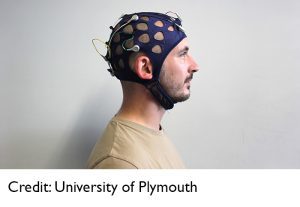 A new brain-monitoring headset, aiming to make diagnosing seizures and other neurological conditions more accessible to local communities, is being developed by researchers at the University of Plymouth.
A new brain-monitoring headset, aiming to make diagnosing seizures and other neurological conditions more accessible to local communities, is being developed by researchers at the University of Plymouth.
Project leaders Prof John Terry and Prof Rohit Shankar and the team are looking to create an affordable, easy-to-use brain monitoring system that could be available to GP surgeries or even for use at home.
The team has developed a prototype headset, which has already been tested. The researchers are now working to scale this into a “validated, community-ready version”, and identify what digital data would be informative to clinicians.
The team is now running feasibility studies in Cornwall, which they say is one of the most “underserved regions for specialist neurology care”.
With the new device, they want to bring testing closer to where people live, “supporting earlier detection of conditions like epilepsy, functional neurological disorder (FND) and even stroke”.
They say this will help avoid long waits and lengthy journeys for EEG testing at hospitals.
“Levelling up neurological care”
Prof Terry said: “This project is about taking the EEG out of the hospital and into the community. By combining digital biomarkers with a point-of-care headset we can give people easier access to faster answers and better care no matter where they live.
“In remote areas of the South West where access to healthcare can often be complex, costly and time-consuming, it could make a real difference to people’s health and outcomes.”
Prof Shankar added: “Reports from the UK Neurological Alliance have routinely highlighted the stark inequalities in access to specialists, with rural and coastal areas like Cornwall often having far fewer neurologists, neuropsychiatrists and psychiatrists than urban centres.
“By exploring solutions that bring testing closer to home, this project represents a step towards levelling up neurological care in line with the NHS long-term plan. It offers renewed hope of timely support and fairer outcomes, and brings the hope of earlier diagnosis and more accessible care to communities that have long faced barriers.”
The team is working with NHS Cornwall & Isles of Scilly Integrated Care Board and Cornwall Partnership NHS Foundation Trust (CFT) on this project.
The project also includes collaborations from organisations including Epilepsy Action, Neuronostics and the Epilepsy Research Institute UK.
The UKRI Engineering and Physical Sciences Research Council (EPSRC) is supporting the £2.45 million project with a £1.9 million grant.
This is one of six new projects funded by the EPSRC, each working to develop simple and affordable diagnostic tools for spaces like GP surgeries, pharmacies or people’s homes.
More articles







